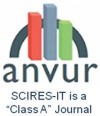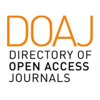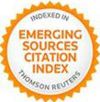- Focus and Scope
- Section Policies
- Peer Review Process
- Publication Frequency
- Open Access Policy
- Archiving
- Publication ethics and publication malpractice
- SCIRES-IT Manifesto 2011
- Information for Authors
- Information for Librarians
- Information for Readers
- Indexing and abstracting
- Articles and submissions processing charges (APC)
Focus and Scope
SCIRES-IT, e-ISSN 2239-4303, provides a forum for the exchange and sharing of know-how in the areas of Digitalization and Multimedia Technologies and Information & Communication Technology (ICT) in support of Cultural and environmental Heritage (CH) documentation, preservation and fruition. It publishes comprehensive reviews on specific fields, regular research papers and short communications in a timely fashion.
The Journal aim is to encourage scientists to publish their experimental results and theoretical work in a comprehensive way. Restrictions on the length of papers is negotiable with the Editors. There are, in addition, other features that this Journal encourages:
Electronic files regarding the full details of theoretical derivations, detailed experimental results, high-resolution renderings, short video animations and audio/video documentaries can be deposited as supplementary material to support the article.
- Multimedia Digital Libraries
- Multimedia, Data Management and Archiving
- Bibliometrics
- Portals and Digital Libraries of Culture
- 2D and 3D Data Acquisition/Capture Methodologies and Data Processing in CH
- 2D and 3D Data Processing in CH
- ICT assistance in monitoring and restoration
- On-site and remotely acquired digital data
- GIS in Cultural Heritage and for the environment
- Remote Sensing for Archaeology and Cultural Heritage Management & Monitoring
- Reproduction Techniques and Rapid Prototyping in CH
- Visualization Techniques (Virtual and Augmented Reality)
- Virtual Museum Applications (e-Museums and e-Exhibitions)
- Virtual Documentation of Archaeological Excavations
- e-Libraries and e-Archives in Cultural Heritage
- Construction and indexing of large scale Multimedia/Multilingual databases
- Computer Animation for CH Applications and Virtual Heritage
- Non-Photorealistic Rendering of CH Data
- Novel Internet-based Cultural Heritage Applications
- Long term availability of content and its long term accessibility
- Effective Technologies for the creation, management and reuse of content and knowledge
- Tools for Education, Documentation and Training in CH
- Archaeological Analysis and Interpretive Design
- Standards, Metadata, Ontologies and Semantic Processing in Cultural Heritage
- Copyrights and IPR in digital Cultural Heritage
- The Economics of Cultural Informatics and Tourism
Section Policies
Editorial
Articles
Peer Review Process
Reviewer selection for each article submitted is up to the editors and takes into account reviewers' experience, competence, suggestions by authors or different editors, and a previous experience in reviewing papers for SCIRES-IT.
Every proposal submitted for publication (full paper) is read at least by an editor, for an initial review. If the paper agrees with editorial policies and with a minimum quality level, is sent to two reviewers or more for evaluation.
SCIRES-IT uses double-blind review, which means that both the reviewer and author identities are concealed from the reviewers, and vice versa, throughout the review process. To facilitate this, authors need to ensure that their manuscripts are prepared in a way that does not give away their identity.
The review process aims to provide authors with a competent opinion on their paper. A review should give authors suggestions, if needed, on how to improve their papers.
The peer-review process is managed with e-mail.
Publication timeline
SCIRES-IT respects the publication timeline shown below in managing editorial workflow:
First editorial review, by an editor at least, with consequent rejection or peer review assignment (within 2 weeks after submission);
First round of peer review (within 4 weeks after the assignment to the reviewers);
Communication to the authors (within 6 weeks after the submission);
Author's modifications of the paper (within 2 weeks after editor's request);
Last editorial decision (within 2 weeks after modifications received).
Publication Frequency
The journal is published in two issues per year.
Open Access Policy
SCIRES-IT is published under a Creative Commons Attribution Licence – NonCommercial-NonDerives 3.0 Italy (CC BY-NC-ND 3.0 IT).
This publication provides immediate open access to its content on the principle that making research freely available to the public supports a greater global exchange of knowledge.
There is no APC or submission fee to publish a work in this journal.
SCIRES-IT is an eco-sustainable open-access journal, which joins the main principles of the Berlin Declaration on Open Access with the aims of the International Convention on Biological Diversity. In line with the publishing projet “OA publications and eco-sustainable”, for each issue of SCIRES-IT, an action of environmental restoration will be made in protected areas by planting local ecotypes of native species.
Archiving
SCIRES-IT utilizes the CEIT Archive to create permanent archives of the journal for purposes of preservation and restoration.
The Journal has been submitted to LOCKSS for preservation purposes.
Publication ethics and publication malpractice
The publication of an article in a peer-reviewed journal is an essential model for SCIRES-IT.
It is necessary to agree upon standards of expected ethical behavior for all parties involved in the act of publishing: the author, the journal editor, the peer reviewer and the publisher.
Our ethic statements are based on COPE's Best Practice Guidelines for Journal Editors.
Publication decisions
The editor of the SCIRES-IT is responsible for deciding which of the articles submitted to the journal should be published. The editor may be guided by the policies of the journal's editorial board and constrained by such legal requirements as shall then be in force regarding libel, copyright infringement and plagiarism. The editor may confer with other editors or reviewers in making this decision.
- Fair play
- An editor at any time evaluate manuscripts for their intellectual content without regard to race, gender, sexual orientation, religious belief, ethnic origin, citizenship, or political philosophy of the authors.
- Confidentiality
- The editor and any editorial staff must not disclose any information about a submitted manuscript to anyone other than the corresponding author, reviewers, potential reviewers, other editorial advisers, and the publisher, as appropriate.
- Disclosure and conflicts of interest
- Unpublished materials disclosed in a submitted manuscript must not be used in an editor's own research without the express written consent of the author.
- Duties of Reviewers
- Contribution to Editorial Decisions
- Peer review assists the editor in making editorial decisions and through the editorial communications with the author may also assist the author in improving the paper.
- Promptness
- Any selected referee who feels unqualified to review the research reported in a manuscript or knows that its prompt review will be impossible should notify the editor and excuse himself from the review process.
- Confidentiality
- Any manuscripts received for review must be treated as confidential documents. They must not be shown to or discussed with others except as authorized by the editor.
- Standards of Objectivity
- Reviews should be conducted objectively. Personal criticism of the author is inappropriate. Referees should express their views clearly with supporting arguments.
- Acknowledgement of Sources
- Reviewers should identify relevant published work that has not been cited by the authors. Any statement that an observation, derivation, or argument had been previously reported should be accompanied by the relevant citation. A reviewer should also call to the editor's attention any substantial similarity or overlap between the manuscript under consideration and any other published paper of which they have personal knowledge.
- Disclosure and Conflict of Interest
- Privileged information or ideas obtained through peer review must be kept confidential and not used for personal advantage. Reviewers should not consider manuscripts in which they have conflicts of interest resulting from competitive, collaborative, or other relationships or connections with any of the authors, companies, or institutions connected to the papers.
- Duties of Authors
- Reporting standards
- Authors of reports of original research should present an accurate account of the work performed as well as an objective discussion of its significance. Underlying data should be represented accurately in the paper. A paper should contain sufficient detail and references to permit others to replicate the work. Fraudulent or knowingly inaccurate statements constitute unethical behavior and are unacceptable.
- Data Access and Retention
- If applicable, authors are asked to provide the raw data in connection with a paper for editorial review, and should be prepared to provide public access to such data, and should in any event be prepared to retain such data for a reasonable time after publication.
- Originality and Plagiarism
- The authors should ensure that they have written entirely original works, and if the authors have used the work and/or words of others, that this has been appropriately cited or quoted.
- Multiple, Redundant or Concurrent Publication
- An author should not in general publish manuscripts describing essentially the same research in more than one journal or primary publication. Submitting the same manuscript to more than one journal concurrently constitutes unethical publishing behaviour and is unacceptable.
- Acknowledgement of Sources
- Proper acknowledgment of the work of others must always be given. Authors should cite publications that have been influential in determining the nature of the reported work.
- Authorship of the Paper
- Authorship should be limited to those who have made a significant contribution to the conception, design, execution, or interpretation of the reported study. All those who have made significant contributions should be listed as co-authors. Where there are others who have participated in certain substantive aspects of the research project, they should be acknowledged or listed as contributors.
- The corresponding author should ensure that all appropriate co-authors and no inappropriate co-authors are included on the paper, and that all co-authors have seen and approved the final version of the paper and have agreed to its submission for publication.
- Disclosure and Conflicts of Interest
- All authors should disclose in their manuscript any financial or other substantive conflict of interest that might be construed to influence the results or interpretation of their manuscript. All sources of financial support for the project should be disclosed.
- Fundamental errors in published works
- When an author discovers a significant error or inaccuracy in his/her own published work, it is the author’s obligation to promptly notify the journal editor or publisher and cooperate with the editor to retract or correct the paper.
Ethical Code
SCIRES-IT Manifesto 2011
SCIRES-IT (SCIentific RESearch and Information Technology - Ricerca Scientifica e Tecnologie dell'Informazione), e‐ISSN 2239‐4303, is an eco-sustainable open-access journal providing an international forum for the exchange and sharing of know-how in the areas of Digitalization and Multimedia Technologies and Information & Communication Technology (ICT) in support of Cultural and environmental Heritage (CH) documentation, preservation and fruition. It publishes comprehensive reviews on specific fields, regular research papers and short communications in a timely fashion.
The Journal aim is to encourage scientists to publish their experimental results and theoretical work in a comprehensive way. Restrictions on the length of papers is negotiable with the Editors. There are, in addition, other features that this Journal encourages: electronic files regarding the full details of theoretical derivations, detailed experimental results, high-resolution renderings, short video animations and audio/video documentaries can be deposited as supplementary material to support the article.
SCIRES-IT is a peer-reviewed journal, available online on a semi-annual basis. It uses OJS (Open Journal System), an open source publishing system.
SCIRES-IT is an eco-sustainable open-access journal, which joins the main principles of the Berlin Declaration on Open Access with the aims of the International Convention on Biological Diversity.
It was founded in 2011 by Virginia Valzano, under the editorial project “Open Access publications eco-sustainable”, launched in 2009 in partnership with CASPUR-CIBER (directed by Francesco Proietti) and SIBA of Salento University (directed by Virginia Valzano), for the development of open access publishing and for the preservation and restoration of the natural environment.
In line with the publishing projet “OA publications and eco-sustainable”, for each issue of SCIRES-IT, an action of environmental restoration will be made in protected areas by planting local ecotypes of native species.
“Our mission of disseminating knowledge is only half complete if the information is not made widely and readily available to society.“ (Berlin Declaration).
“We can survive as a species only if we live by the rules of the biosphere. The biosphere has enough for everyone's needs if the global economy respects the limits set by sustainability and justice.” (Vandana Shiva, Indian environmental activist).
Virginia Valzano
January 2011
Information for Authors
Interested in submitting to this journal? We recommend that you review the About the Journal page for the journal's section policies, as well as the Author Guidelines. Authors need to register with the journal prior to submitting, or if already registered can simply log in and begin the five-step process.
Information for Librarians
We encourage research librarians to list this journal among their library's electronic journal holdings. As well, it may be worth noting that this journal's open source publishing system is suitable for libraries to host for their faculty members to use with journals they are involved in editing (see Open Journal Systems).
Information for Readers
We encourage readers to sign up for the publishing notification service for this publication. Use the Register link at the top of the home page for the publication. This registration will result in the reader receiving the Table of Contents by email for each new issue of the publication. This list also allows the publication to claim a certain level of support or readership. See the publication's Privacy Statement, which assures readers that their name and email address will not be used for other purposes.
Indexing and abstracting
SCIRES-IT is indexed and repertoired by:
- ACNP - Italian Union Catalogue of Serials
- APeJ - Academic Publications eJournal
- BASE - Bielefield Academic Search Engine
- British Library (London, UK)
- Copac - National Academic and Specialist Library Catalogue
- DOAJ - Directory of Open Access Journal
- EBSCO - Provider of research databases & e-journals
- ERIH PLUS - European Reference Index for the Humanities and the Social Sciences
- Google Scholar - Web search engine of scholarly literature
- Journal Finder - Fayetteville State University
- Journals for Free - International aggregator of scientific journals
- JURN - Academic Search Engine
- Leo - Letteratura Elettronica Online
- MIAR- Information Matrix for the Analysis of Journals
- OAIster - World's largest library catalog
- OpenAIRE - Open Access Infrastructure for Research in Europe
- Open Access Library (OALib) - Search Engine, Journal, Index, Repository
- Primo Central Index (Ex Libris) - Mega-aggregation of Open Access content
- ProQuest Central -Empowers researchers and librarians around the world
- ROAD - Directory of Open Access scholarly Resources
- SCOPUS - Abstract and Citation Database
- SJSU - Electronic Journals Index
- Summon - Discovery Tool
- Ulrich's - Global Serials Directory
- Worldcat - The world's largest library
- VUB - Vrije Universiteit Brussel
- WoS - Web of Science. Emerging Sources Citation Index (ESCI)
Articles and submissions processing charges (APC)
SCIRES-IT does not require authors to pay any article submission or processing charges (APCs) when submitting an article for possible publication in the journal.




